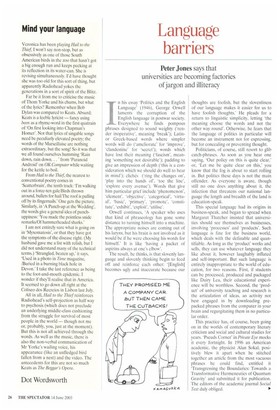Mind your language
Veronica has been playing Hail to the Thief I won't say non-stop, but as obsessively as one of those South American birds in the zoo that hasn't got a big enough run and keeps pecking at its reflection in its water-can. She is revising simultaneously. I'd have thought she was too old for this sort of thing, but apparently Radiohead yokes the generations in a sort of spirit of the Blitz.
Far be it from me to criticise the music of Thom Yorke and his chums, but what of the lyrics? Remember when Bob Dylan was compared to Keats. Absurd; Keats is a feeble lyricist — fancy using been as a rhyme-word in the first quatrain of 'On first looking into Chapman's Homer'. Not that lyrics of singable songs need be peculiarly elevated poetry; the words of the Marseillaise are nothing extraordinary, but the song! So it was that we all found ourselves humming 'Rain down, rain down. . . 'from 'Paranoid Android' on OK Computer while waiting for the kettle to boil.
From Hail to the Thief, the nearest to conventional poetry comes in 'Scatterbrain', the tenth track: 'I'm walking out in a force-ten gale/Birds thrown around, bullets for hailffhe roof is pulling off by its fingernails.' One gets the picture. Similarly, in 'A Punch-up at the Wedding', the words give a general idea of punchuppiness: 'You made the pointless snide remarks/Of hammerheaded sharks.'
I am not entirely sure what is going on in 'Myxomatosis', or that they have got the symptoms of the disease right. (My husband gave me a list with relish, but I did not understand many of the technical terms.) 'Strangled, beaten up,' it says, 'Used in a photo in Time magazine, Buried in a burning black hole in Devon.' I take the last reference as being to the foot-and-mouth epidemic. I wonder if they'll realise that in America. It seemed to go down all right at the Coliseo dos Recreios in Lisbon last July.
All in all, Hail to the Thief reinforces Radiohead's self-projection as half way to psychosis (which does not preclude an underlying middle-class cushioning from the struggle for survival of most people in the world — though not me or, probably, you, just at the moment). But this is not all achieved through the words. As well as the music, there is also the non-verbal communication of Mr Yorke's wailing voice, his appearance (like an unfledged bird fallen from a nest) and the video. The antecedents for this are not so much Keats as The Beggar's Opera.
Dot Wordsworth


































































































 Previous page
Previous page